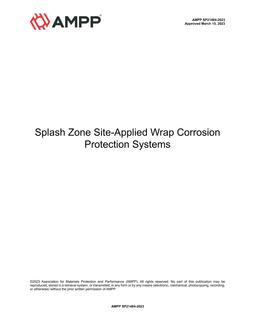Standard Test Method – Evaluating Elastomeric Materials in Sour Gas Environments
standard by National Association of Corrosion Engineers, 04/01/1992

IEC ICC JEDEC ISPE MMPDS EEMUA

Standard Test Method – Evaluating Elastomeric Materials in Sour Gas Environments
standard by National Association of Corrosion Engineers, 04/01/1992

Standard Test Method – Evaluation of Pipeline and Pressure Vessel Steels for Resistance to Hydrogen-Induced Cracking
standard by National Association of Corrosion Engineers, 01/17/2003

Splash Zone Site-Applied Wrap Corrosion Protection Systems
Report / Survey by National Association of Corrosion Engineers, 03/15/2023

Standard Material Requirements – Sulfide Stress Cracking Resistant Metallic Materials for Oilfield Equipment
standard by National Association of Corrosion Engineers, 01/01/2000

Standard Material Requirements – Materials Resistant to Sulfide Stress Cracking in Corrosive Petroleum Refining Environments
standard by National Association of Corrosion Engineers, 03/03/2003

Standard Test Method – Laboratory Corrosion Testing of Metals in Static Chemical Cleaning Solutions at TemperaturesBelow 93 Degrees C (200 Degrees F)
standard by National Association of Corrosion Engineers, 12/01/1993

Standard Recommended Practice – Recommended Practice for Prevention, Detection and Correction of Deaerator Cracking
standard by National Association of Corrosion Engineers, 03/30/1996

Standard Test Method – Evaluation of Pipeline and Pressure Vessel Steels for Resistance to Hydrogen-Induced Cracking
standard by National Association of Corrosion Engineers, 03/30/1996

Standard Test Method – Holiday Detection of Internal Tubular Coatings of 250 to 760 um (10 to 30 mils) Dry Fillm Thickness
standard by National Association of Corrosion Engineers, 11/01/1985

Joint Surface Preparation Standard: Surface Preparation and Cleaning of Steel and Other Hard Materials by High- and Ultrahigh-Pressure Water Jetting Prior to Recoating
standard by National Association of Corrosion Engineers, 01/01/1995